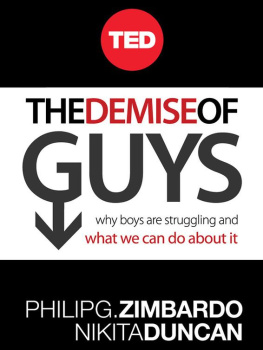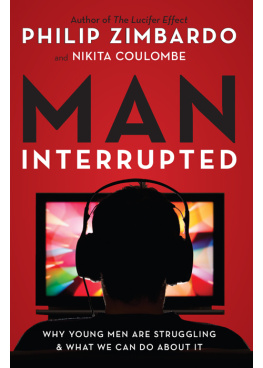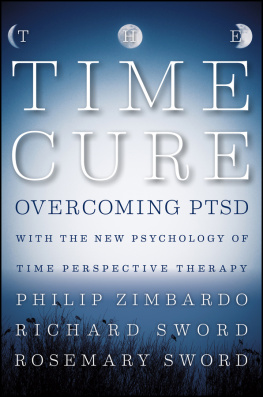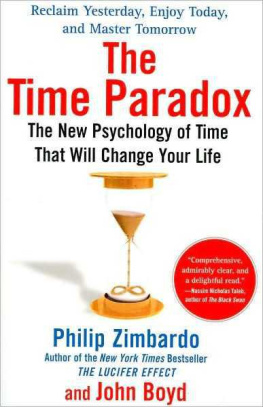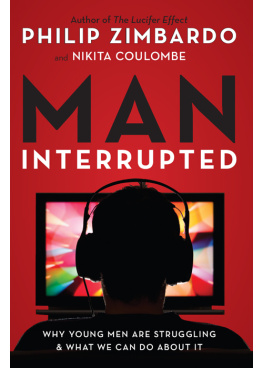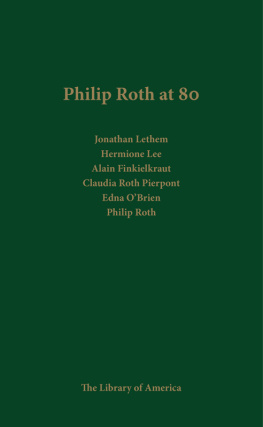
Zimbardos autobiography contains revealing and compelling information that provides deep insights into the mind, person, and research of one of psychologys living icons. From explaining how good people can do bad things to how ordinary people can become heroes, Zimbardo provides an insiders perspective of his research that has impacted our understanding of each other and of the world around us.
Dr. Antonio Puente
Past President of APA
(American Psychological Association)
Throughout his storied career, Professor Zimbardo has been at the forefront of psychological science. His teaching, mentoring, and research have shaped generations of students and scientists at Stanford and beyond, and his research and science communication have had sustained impacts on the field and on societys understanding of the human condition. In his autobiography, Zimbardo and Hartwig provide new insights into a remarkable life and career.
Anthony Wagner
Chair Stanford Psychology Department
From the Bronx to Yale to Stanford: Thats only a small fraction of the story of my Stanford University teacher and friend, Emeritus Professor Philip Zimbardo. Gifted educator, who stimulated so many of us to pursue careers in psychology, and ingenious social scientist, who showed us the power of social situations over individual dispositions, Professor Zimbardo is still going strong. His autobiography takes us from his immigrant Sicilian roots to his current project on the heroic imagination in each of us. In between, he reveals to us what makes him tick as well as new insights about the controversies his studies taught and discussed years after their completion continue to stir up. While we learn the details of his life thus far, we are inspired to live our own to the fullest.
Peter Salovey
University President and Chris Argyris
Professor of Psychology
Yale University
Sharing his twisting path from South Bronx to Stanford University, Phil Zimbardo brings us into his early world of poverty and whooping cough as he careens off the social walls of discrimination. His moving life story offers hope, empathic insights into his prescient research and activism, plus an uplifting role model for turning our own challenges into successes through imagination and caring.
Shari Young Kuchenbecker, Ph.D.
R. W. Research, Inc. Director
Every passage in Phil Zimbardos life is accompanied by words and images that turn readers into viewers of a compelling film blending a mans internal dialogue with the strict laws of science. We learn about events, encounters, and anecdotes, awaiting the extraordinary twist in a story that has the ability to enrich and improve those reading it. The reader can grasp the underlying narrative thread of Zimbardos original, richly woven life, recognizing the non-linear trajectories that distinguish the biographies of the key players in psychologys history.
Prof. Mauro Cozzolino
Osservatorio sulla Promozione del Benessere
University of Salerno
P S Y C H O L O G Y P A P E R S G I U N T I
Zimbardo
My Life Revealed
An Oral History conducted by Daniel Hartwig,
Stanford University
Foreword by Shari Young Kuchenbecker
Afterword by Mauro Cozzolino
www.giuntipsy.it
https://www.facebook.com/GiuntiOS/
https://twitter.com/GiuntiPsy
https://www.linkedin.com/company/giunti-os-psychometrics/
https://www.youtube.com/user/GiuntiOS
Original title:
An Oral History conducted by Daniel Hartwig
Published in English by the Stanford Historical Society. 2016-2018 Board of Trustees of the Leland Stanford Junior University.
Copyright 2021 by the Board of Trustees of the Leland Stanford Junior University. All rights reserved. This translation is published by arrangement with Stanford University.
Photo gallery: images reproduced by kind permission of the author.
No parts of this publication may be reproduced, by any means, without the prior permission of the publisher.
The publisher declares its willingness to settle any outstanding royalties for those images whose source could not be identified.
www.giuntipsy.it
www.giunti.it
2021 Giunti Psychometrics S.r.l.
Via Fra Paolo Sarpi 7/A, 50136 Firenze Italia
First edition: june 2021
First digital edition: july 2021
ISBN 9788809964433
THE BOOK
In a direct and spontaneous dialogue, the legendary American psychologist Philip Zimbardo talks about his life and career: his childhood in the Bronx, his university education at Yale, his friendship with Stanley Milgram, his appointment to the Stanford psychology faculty, his research, and his contributions in the psychological field and in the academic context, as well as his involvement in political activism, from meeting Malcolm X to writing an article on President Donald Trumps mental health, published in Psychology Today.
The resulting memoir is a rich collection of moving stories and insightful reflections on his career and his intellectual legacy.
The text - edited by Daniel Hartwig - is in interview form and is part of the Stanford Historical Societys Oral History Program in collaboration with the Stanford University Archives.
THE AUTHORS
PHILIP G. ZIMBARDO
Psychologist, educator, researcher, and world-famous public figure. Professor emeritus at Stanford University. Former President of the American Psychological Association (APA).
Zimbardo is well-known for his Stanford prison experiment. The author of successful books, including The Lucifer Effect, The Time Paradox, Time Cure, and Living and Loving Better, he was co-author of the Psychology and Life textbook up to its nineteenth edition.
Zimbardo is the founder and president of the Heroic Imagination Project, an international organization created to encourage the psychology of heroism in everyday life, and of the Z-L Fund, a foundation promoting cultural exchange between Italy and the United States.
DANIEL HARTWIG
Daniel Hartwig was the Stanford University Archivist from 2010 to 2019. He was the Records Services Archivist at Yale University (2006-2010); Assistant Archivist and Digital Projects Developer at Ball State University (2004-2006); and Archives Reference Assistant at the Wisconsin Historical Society (2002-2004).
Contents
Foreword
Where to begin an autobiography Foreword for one of the worlds most famous psychologists
This is Social Psychology, he announced, and there will be no textbookbecause we dont know enough yet.
Stanford University, spring, 1970. Phil would go on that quarter to create staged real life-dramas including a purse snatching with audience role-players and shooting off a gun mid-demonstration. As he does in his autobiographical story here, Phil helped us experience the world through






